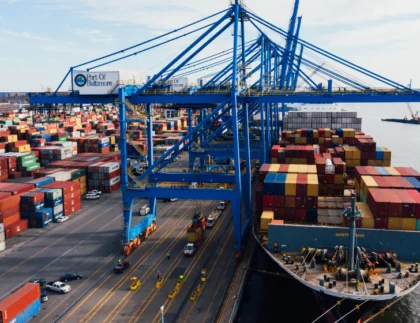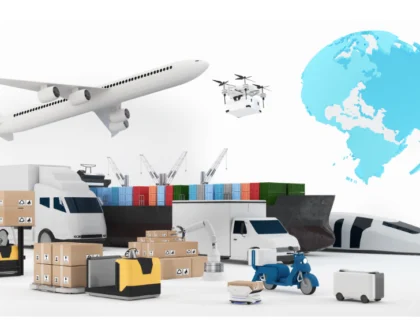
In today's rapidly evolving logistics landscape, integrating cloud-based freight management systems has become a pivotal strategy for companies aiming to enhance efficiency, scalability, and visibility. The shift towards remote logistics operations, powered by advanced logistics technology, transforms traditional supply chain models into agile, digital supply chains.
This article delves into the benefits, implementation strategies, and prospects of leveraging cloud logistics platforms for effective freight management solutions.
The Rise of Cloud-Based Freight Management
The logistics industry has long been characterized by reliance on manual processes and traditional legacy systems, often resulting in operational inefficiencies, limited scalability, and restricted visibility across supply chains. However, with the advent of cloud-based freight management systems, companies are witnessing a transformative shift in handling logistics operations.
Businesses can remotely manage their freight and supply chain processes by leveraging cloud technology, ensuring real-time data accessibility and greater operational agility. These platforms enable seamless integration with existing enterprise systems, fostering a more cohesive and interconnected logistics ecosystem.
Data-driven freight management approach

The transition from conventional methods to cloud-based solutions is not merely an upgrade but a fundamental shift towards a more thoughtful, data-driven freight management approach.
Companies that adopt these cloud-powered logistics platforms gain the ability to scale operations dynamically, respond swiftly to market fluctuations, and optimize costs by minimizing dependence on physical infrastructure. Furthermore, real-time tracking and analytics empower logistics teams to enhance decision-making processes, mitigate risks, and improve overall supply chain performance.
As businesses increasingly prioritize flexibility and digital transformation, cloud-based freight management has emerged as a strategic necessity, paving the way for a more resilient and future-ready logistics landscape.
Key Advantages of Cloud Logistics Platforms
- Enhanced Data Accessibility: With cloud logistics platforms, stakeholders can access critical information from anywhere, anytime. This data accessibility in logistics ensures that teams can collaborate effectively, regardless of geographical location.
- Scalability: Cloud solutions offer the flexibility to scale operations up or down based on demand without significant capital investment in infrastructure. This scalability is crucial for adapting to market fluctuations and business growth.
- Cost Efficiency: By reducing reliance on physical infrastructure and minimizing maintenance costs, cloud-based freight management systems contribute to significant cost savings. Additionally, the pay-as-you-go model allows companies to manage expenses more effectively.
- Real-Time Remote Monitoring: Remote real-time monitoring of shipments and logistics processes enhances operational visibility, allowing for proactive issue resolution and improved customer service.
- Integration Capabilities: Modern logistics software can seamlessly integrate with existing systems, ensuring a cohesive digital ecosystem that enhances overall efficiency.
Implementing Cloud-Based Freight Management Solutions
Transitioning to a cloud-based freight management system involves several strategic steps:
- Assessment of Current Systems: Evaluate existing logistics processes to identify areas that would benefit from cloud integration. This assessment helps understand the specific needs and potential challenges in the transition.
- Selection of the Right Platform: Choose a cloud logistics platform that aligns with your business requirements. Consider scalability, integration capabilities, user-friendliness, and vendor support.
- Data Migration and Integration: Plan and execute data migration from legacy systems to the new platform, ensuring data integrity and minimal disruption to operations. Integration with other enterprise systems is crucial for a unified workflow.
- Training and Change Management: Invest in training programs to familiarize your team with the new system. Effective change management strategies will facilitate a smoother transition and encourage user adoption.
- Continuous Monitoring and Optimization: After implementation, continuously monitor system performance and gather user feedback to identify areas for improvement. Regular updates and optimizations will ensure the system remains aligned with evolving business needs.

Challenges and Considerations
While the benefits of cloud-based freight management are substantial, companies should be mindful of potential challenges:
- Data Security: Ensuring the security of sensitive information in the cloud is paramount. Implement robust security protocols and choose reputable service providers with strong security measures.
- Compliance: Adhere to industry regulations and standards when managing data and operations in the cloud. This includes understanding data sovereignty laws and ensuring compliance across different regions.
- Downtime and Reliability: While cloud providers offer high uptime guarantees, it's essential to have contingency plans in place to manage potential service disruptions.
Future Trends in Cloud Logistics
The future of cloud logistics platforms is poised for significant advancements:
- Artificial Intelligence and Machine Learning: Integrating AI and ML can enhance predictive analytics, demand forecasting, and route optimization, leading to more efficient operations.
- Internet of Things (IoT): IoT devices can provide real-time data on shipment conditions, locations, and statuses, further enhancing remote monitoring capabilities.
- Blockchain Technology: Implementing blockchain can improve transparency and security in the supply chain, facilitating trust among stakeholders.
Harnessing The Advantages of Cloud Logistics.
Embracing cloud-based freight management is no longer a choice but a strategic necessity in the swiftly changing logistics landscape. As global supply chains become more complex and demand greater agility, companies that fail to adapt risk falling behind. Cloud logistics platforms provide the foundation for a digitally connected, data-driven freight ecosystem that enhances efficiency, scalability, and visibility at every level.
The transition to remote logistics operations transcends mere convenience; it signifies a fundamental change in how businesses engage with supply chain management. By eradicating dependence on obsolete legacy systems and manual workflows, companies can achieve unparalleled levels of operational control, enabling them to foresee disruptions, enhance routing, and accurately oversee freight movement. Real-time monitoring, powered by cloud technology, ensures decision-makers are equipped with actionable insights, reducing downtime and increasing responsiveness to market fluctuations.

However, successful cloud integration requires careful planning, including evaluating existing operational bottlenecks, selecting the appropriate platform, implementing smooth data migration, and promoting organization-wide adoption. Security, compliance, and reliability must consistently remain at the forefront of this transformation, guaranteeing that businesses harness the advantages of cloud logistics in a secure, scalable, and sustainable manner.
Conclusion
Technological technologies such as artificial intelligence, machine learning, the Internet of Things (IoT), and blockchain will influence the future of cloud-based freight management, further enhancing efficiency and transparency.
Companies that proactively invest in these advancements will gain a competitive edge, positioning themselves as leaders in the next generation of global logistics. The digital revolution in freight management is here, and those who embrace it today will define the industry’s future tomorrow.











